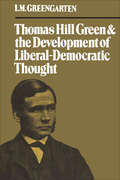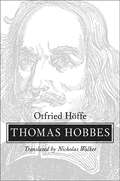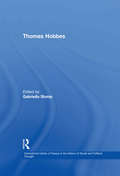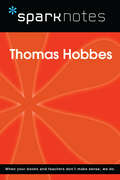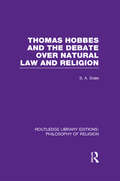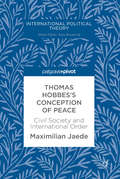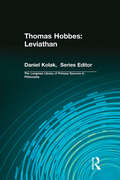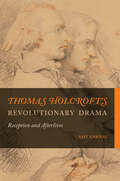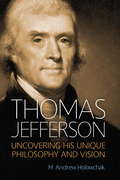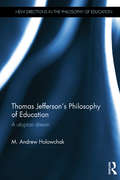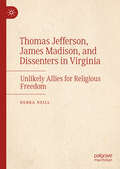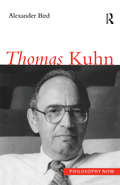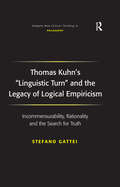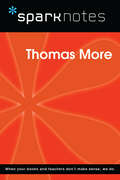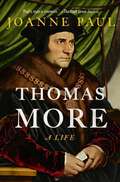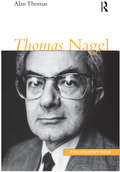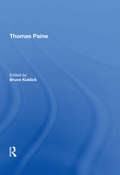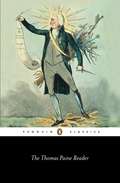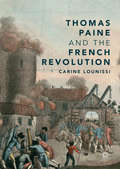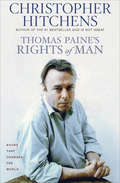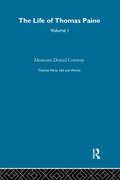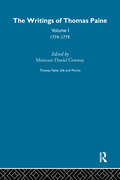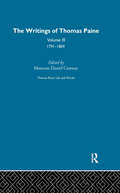- Table View
- List View
Thomas Hill Green and the Development of Liberal-Democratic Thought
by I. M. GreengartenThomas Hill Green (1836-1882) was a leading British philosopher and political figure and founder of the school of British Idealism, which displaced the philosophy of Bentham and John Stuart Mill as the dominant tradition in British universities from 1880 into the twentieth century. Greengarten presents a detailed analysis of Green's thought, including his theories of political obligation, property, self-realization, and human nature, and developed the necessary tools for an analysis of Green's work and the tradition of liberal-democratic thought. He finds in Green a view of human nature and human potentialities which is in striking contract to the views of earlier liberal thinkers, and remarkably similar to that of Marx - despite Green's clear and often passionate defence of capitalism and market freedom. His concept of human nature is of a divided, self-contradictory nature; his theory of the true good is of a good that is to be shared, a common good that is not attainable through the selfish pursuit of private goods; his vision of the good society foresees the elimination of poverty, and the establishment of a classless society wherein all members would have equal opportunity to develop and realize their potential. This book offers a fresh perspective on Green and raises issues of importance in the field of social and political theory.
Thomas Hobbes
by Otfried HöffeBest known for his contributions to political philosophy, Thomas Hobbes set out to develop a coherent philosophical system extending from logic and natural philosophy to civil and religious philosophy. In this introduction to Hobbes's thought, Otfried Höffe begins by providing an overview of the entire scope of his work, making clear its systematic character through analysis of his natural philosophy, his individual and social anthropology, and his political thought. He then offers an innovative examination of religious and ecclesiastical questions, touching not only on the political implications of religion so important to Hobbes, but also on his attempt to reconstruct Christianity in terms of a materialistic philosophy. He also explores Hobbes's continuous critique of Aristotle and Aristotelian Scholastics, in which Höffe argues that Hobbes and Aristotle have much more in common philosophically than is normally supposed—and certainly more than Hobbes himself acknowledged. Finally, Höffe sketches the influence Hobbes had and continues to have on the development of legal and political philosophy.
Thomas Hobbes (International Library of Essays in the History of Social and Political Thought)
by Gabriella SlompThe aim of this collection is twofold: on the one hand, it brings together the most significant and influential articles on Hobbes that have been published in the twentieth century; on the other hand, it aims at capturing the trend of fragmentation of Hobbes studies offering a taste of early epic interpretations that engaged with the whole of Hobbes’s theory, and a taste of later works interested in capturing more limited narratives and at recounting parallel stories that seem to be running through Hobbes’s works. The introduction offers a compass to orient the reader’s journey through the collection.
Thomas Hobbes (SparkNotes Philosophy Guide)
by SparkNotesThomas Hobbes (SparkNotes Philosophy Guide) Making the reading experience fun! SparkNotes Philosophy Guides are one-stop guides to the great works of philosophy–masterpieces that stand at the foundations of Western thought. Inside each Philosophy Guide you&’ll find insightful overviews of great philosophical works of the Western world.
Thomas Hobbes and the Debate over Natural Law and Religion (Routledge Library Editions: Philosophy of Religion)
by Stephen A. StateThe argument laid out in this book discusses and interprets the work of Hobbes in relation to religion. It compares a traditional interpretation of Hobbes where Hobbes’ use of conventional terminology when talking about natural law is seen as ironic or merely convenient despite an atheist viewpoint, with the view that Hobbes’ morality is truly traditional and Christian. The book considers other thinkers of the age in tandem with Hobbes and discusses in detail his theology inspired by corporeal mechanics. The position is that there are significant senses in which Hobbes can be said to be a traditional natural law theorist.
Thomas Hobbes's Conception of Peace: Civil Society And International Order (International Political Theory Ser.)
by Maximilian JaedeThis book explores Hobbes’s ideas about the internal pacification of states, the prospect of a peaceful international order, and the connections between civil and international peace. It questions the notion of a negative Hobbesian peace, which is based on the mere suppression of violence, and emphasises his positive vision of everlasting peace in a well-governed commonwealth. The book also highlights Hobbes’s ideas about international coexistence and cooperation, which he considers integral to good government. In examining Hobbes’s conception of peace, it provides a fresh perspective on his international political thought. The findings also have wider implications for the ways in which we think about Hobbes’s relationship to the realist and liberal traditions of international thought, and will appeal to students and scholars of political theory and international relations.
Thomas Hobbes: Leviathan (Longman Library of Primary Sources in Philosophy)
by Thomas Hobbes Marshall MissnerPart of the “Longman Library of Primary Sources in Philosophy,” this edition of Hobbes's Leviathan is framed by a pedagogical structure designed to make this important work of philosophy more accessible and meaningful for undergraduates.
Thomas Hobbes: On the Citizen
by Richard Tuck Thomas HobbesDe Cive (On the Citizen) is the first full exposition of the political thought of Thomas Hobbes, the greatest English political philosopher of all time. Professors Tuck and Silverthorne have undertaken the first complete translation since 1651, a rendition long thought (in error) to be at least sanctioned by Hobbes himself. On the Citizen is written in a clear, straightforward, expository style, offering students a more digestible account of Hobbes' political thought than even Leviathan itself. This new translation is itself a very significant scholarly event.
Thomas Holcroft’s Revolutionary Drama: Reception and Afterlives (Transits: Literature, Thought & Culture, 1650-1850)
by Amy GarnaiA key figure in British literary circles following the French Revolution, novelist and playwright Thomas Holcroft promoted ideas of reform and equality informed by the philosophy of his close friend William Godwin. Arrested for treason in 1794 and released without trial, Holcroft was notorious in his own time, but today appears mainly as a supporting character in studies of 1790s literary activism. Thomas Holcroft’s Revolutionary Drama authoritatively reintroduces and reestablishes this central figure of the revolutionary decade by examining his life, plays, memoirs, and personal correspondence. In engaging with theatrical censorship, apostacy, and the response of audiences and critics to radical drama, this thoughtful study also demonstrates how theater functions in times of political repression. Despite his struggles, Holcroft also had major successes: this book examines his surprisingly robust afterlife, as his plays, especially The Road to Ruin, were repeatedly revived worldwide in the nineteenth century.
Thomas Jefferson
by M. Andrew HolowchakThis is the first book to systematize the philosophical content of Thomas Jefferson's writings. Sifting through Jefferson's many addresses, messages, and letters, philosopher M. Andrew Holowchak uncovers an intensely curious Enlightenment thinker with a well-constructed, people-sympathetic, and consistent philosophy. As the author shows, Jefferson's philosophical views encompassed human nature, the cosmos, politics, morality, and education. Beginning with his understanding of the cosmos, part one considers Jefferson's philosophical naturalism and the influence on him of Francis Bacon, Isaac Newton, and John Locke. The next section critically examines his political viewpoints, specifically his republicanism, liberalism, and progressivism. The third part, "Jefferson on Morality," analyzes Jefferson's thoughts on human nature, his moral-sense theory, and his notion of "natural aristoi" (best or most virtuous citizens). Finally, "Jefferson on Education" reviews his ideas on properly educating the people of the new nation for responsible, participatory citizenry. Jefferson conceived of the United States as a "great experiment"--embodying a vision of a government responsibly representative of its people and functioning for the sake of them. This book will help readers understand the philosophical perspective that sustained this audacious, innovative, and people-first experiment.
Thomas Jefferson's Philosophy of Education: A utopian dream (New Directions in the Philosophy of Education)
by M. Andrew HolowchakThomas Jefferson had a profoundly advanced educational vision that went hand in hand with his political philosophy - each of which served the goal of human flourishing. His republicanism marked a break with the conservatism of traditional non-representative governments, characterized by birth and wealth and in neglect of the wants and needs of the people. Instead, Jefferson proposed social reforms which would allow people to express themselves freely, dictate their own course in life, and oversee their elected representatives. His educational vision aimed to instantiate a progressive social climate only dreamed of by utopists such as Thomas More, James Harrington and Louis-Sébastian Mercier. This book offers a critical articulation of the philosophy behind Jefferson’s thoughts on education. Divided into three parts, chapters include an analysis of his views on elementary and higher education, an investigation of education for both the moral-sense and rational faculty, and an examination of education as lifelong learning. Jefferson’s educational rationale was economic, political and philosophical, and his systemic approach to education conveys a systemic, economic approach to living, with strong affinities to Stoicism. Thomas Jefferson’s Philosophy of Education will be key reading for philosophers, historians and postgraduate students of education, the history of education and philosophy.
Thomas Jefferson, James Madison, and Dissenters in Virginia: Unlikely Allies for Religious Freedom
by Debra NeillThis book follows the campaign to disestablish religion in Virginia from 1776 to 1786, when Thomas Jefferson&’s bill to establish religious freedom was passed. This volume seeks to tell the story of Jefferson and James Madison&’s collaboration with Virginia&’s religious dissenters; in doing so, Neill works to understand why religion was disestablished in Virginia. Neill argues that despite their religious differences these unlikely allies shared a basic understanding of what religious freedom meant and how best to secure it: by severing the ties between church and state.
Thomas Kuhn (Philosophy Now Ser.)
by Alexander BirdThomas Kuhn (1922-96) transformed the philosophy of science. His seminal 1962 work "The Structure of Scientific Revolutions" introduced the term 'paradigm shift' into the vernacular and remains a fundamental text in the study of the history and philosophy of science. This introduction to Kuhn's ideas covers the breadth of his philosophical work, situating "The Structure of Scientific Revolutions" within Kuhn's wider thought and drawing attention to the development of his ideas over time. Kuhn's work is assessed within the context of other philosophies of science notably logical empiricism and recent developments in naturalized epistemology. The author argues that Kuhn's thinking betrays a residual commitment to many theses characteristic of the empiricists he set out to challenge. Kuhn's influence on the history and philosophy of science is assessed and where the field may be heading in the wake of Kuhn's ideas is explored.
Thomas Kuhn's 'Linguistic Turn' and the Legacy of Logical Empiricism: Incommensurability, Rationality and the Search for Truth (Ashgate New Critical Thinking in Philosophy)
by Stefano GatteiPresenting a critical history of the philosophy of science in the twentieth century, focusing on the transition from logical positivism in its first half to the "new philosophy of science" in its second, Stefano Gattei examines the influence of several key figures, but the main focus of the book are Thomas Kuhn and Karl Popper. Kuhn as the central figure of the new philosophy of science, and Popper as a key philosopher of the time who stands outside both traditions. Gattei makes two important claims about the development of the philosophy of science in the twentieth century; that Kuhn is much closer to positivism than many have supposed, failing to solve the crisis of neopostivism, and that Popper, in responding to the deeper crisis of foundationalism that spans the whole of the Western philosophical tradition, ultimately shows what is untenable in Kuhn's view. Gattei has written a very detailed and fine grained, yet accessible discussion making exceptionally interesting use of archive materials.
Thomas More (SparkNotes Philosophy Guide)
by SparkNotesThomas More (SparkNotes Philosophy Guide) Making the reading experience fun! SparkNotes Philosophy Guides are one-stop guides to the great works of philosophy–masterpieces that stand at the foundations of Western thought. Inside each Philosophy Guide you&’ll find insightful overviews of great philosophical works of the Western world.
Thomas More: A Life
by Joanne PaulThe definitive biography of the man who dominated political and intellectual circles in England during the sixteenth century: Thomas More.Born into the era of the Wars of the Roses, educated during the European Renaissance, rising to become Chancellor of England, and ultimately destroyed by Henry VIII, Thomas More was one of the most famous—and notorious—figures in English history. Was he a saintly scholar, the visionary author of Utopia, and an inspiration for statesmen and intellectuals even today? Or was he the cruel zealot famously portrayed in Hilary Mantel's Wolf Hall? Thomas More: A Life is a monumental biography of this hypnotic, flawed figure. Overturning prior interpretations of this titan of the sixteenth century, Joanne Paul shows Thomas More to have been intellectually and politically central to the making of modern Europe. Based on new archival discoveries and drawing on more than a decade of research into More&’s life and work, this is a richly told story of faith and politics that illuminates a man who, more than four hundred years after his execution, remains one of the most brilliant minds of the Renaissance.
Thomas Nagel (Philosophy Now Ser.)
by Alan ThomasIn the first systematic study of the philosophy of Thomas Nagel, Alan Thomas discusses Nagel's contrast between the "subjective" and the "objective" points of view throughout the various areas of his wide ranging philosophy. Nagel's original and distinctive contrast between the subjective view and our aspiration to a "view from nowhere" within metaphysics structures the chapters of the book. A "new Humean" in epistemology, Nagel takes philosophical scepticism to be both irrefutable and yet to indicate a profound truth about our capacity for self-transcendence. The contrast between subjective and objective views is then considered in the case of the mind, where consciousness proves to be the central aspect of mind that contemporary theorising fails to acknowledge adequately. The second half of the book analyses Nagel's work on moral and political philosophy where he has been most deeply influential. Topics covered include the contrast between agent-relative and agent-neutral reasons and values, Nagel's distinctive version of a hybrid ethical theory, his discussion of life's meaningfulness and finally his sceptical arguments about whether a liberal society can reconcile the conflicting moral demands of self and other.
Thomas Paine (International Library Of Essays In The History Of Social And Political Thought Ser.)
by Bruce KuklickThomas Paine is a unique political thinker who has continued to attract scholarly and popular attention from the time he wrote about both the American and French Revolutions at the end of the eighteenth century. This collection brings together the most recent essays debating the meaning and relevance of Paine's works. It includes an historiographical survey of scholarship about Paine and articles by the leading authorities in the field. The essays survey his life, analyze his ideas, place them in their social and intellectual context, and appraise their significance today.
Thomas Paine Reader
by Thomas PaineThis major collection demonstrates the extent to which Thomas Paine (1737-1809) was an inspiration to the Americans in their struggle for independence, a passionate supporter of the French Revolution and perhaps the outstanding English radical writer of his age. It contains all of Paine's major works including The Rights of Man, his groundbreaking defence of the revolutionary cause in France, Common Sense, which won thousands over to the side of the American rebels, and the first part of The Age of Reason (Part One), a ferocious attack on Christianity. The shorter pieces - on capital punishment, social reform and the abolition of slavery - also confirm the great versatility and power of this master of democratic prose.
Thomas Paine and the French Revolution
by Carine LounissiThis book explores Thomas Paine's French decade, from the publication of the first part of Rights of Man in the spring of 1791 to his return trip to the United States in the fall of 1802. It examines Paine's multifarious activities during this period as a thinker, writer, member of the French Convention, lobbyist, adviser to French governments, officious diplomat and propagandist. Using previously neglected sources and archival material, Carine Lounissi demonstrates both how his republicanism was challenged, bolstered and altered by this French experience, and how his positions at key moments of the history of the French experiment forced major participants in the Revolution to defend or question the kind of regime or of republic they wished to set up. As a member of the Lafayette circle when writing the manuscript of Rights of Man, of the Girondin constellation in the Convention, one of the few democrats who defended universal suffrage after Thermidor, and as a member of the Constitutional Circle which promoted a kind of republic which did not match his ideas, Paine baffled his contemporaries and still puzzles the present-day scholar. This book intends to offer a new perspective on Paine, and on how this major agent of revolutions contributed to the debate on the French Revolution both in France and outside France.
Thomas Paine and the Idea of Human Rights
by Robert LambThomas Paine is a legendary Anglo-American political icon: a passionate, plain-speaking, relentlessly controversial, revolutionary campaigner, whose writings captured the zeitgeist of the two most significant political events of the eighteenth century, the American and French Revolutions. Though widely acknowledged by historians as one of the most important and influential pamphleteers, rhetoricians, polemicists and political actors of his age, the philosophical content of his writing has nevertheless been almost entirely ignored. This book takes Paine's political philosophy seriously. It explores his views concerning a number of perennial issues in modern political thought including the grounds for, and limits to, political obligation; the nature of representative democracy; the justification for private property ownership; international relations; and the relationship between secular liberalism and religion. It shows that Paine offers a historically and philosophically distinct account of liberalism and a theory of human rights that is a progenitor of our own.
Thomas Paine's Rights of Man: A Biography (Books That Changed the World #6)
by Christopher HitchensChristopher Hitchens, the #1 New York Times bestselling author of God Is Not Great has been called a Tom Paine for our times, and in this addition to the Books that Changed the World Series, he vividly introduces Paine and his Declaration of the Rights of Man, the world’s foremost defense of democracy. Inspired by his outrage at Edmund Burke’s attack on the French Revolution, Paine’s text is a passionate defense of man’s inalienable rights, and the key to his reputation. Ever since the day of publication in 1791, Declaration of the Rights of Man has been celebrated, criticized, maligned, suppressed, and co-opted, but in Thomas Paine’s Rights of Man, Hitchens marvels at its forethought and revels in its contentiousness. Famous as a polemicist and provocative commentator, Hitchens is a political descendent of the great pamphleteer. In this engaging work he demonstrates how Thomas Paine’s book forms the philosophical cornerstone of the United States of America, and how "in a time when both rights and reason are under attack, the life and writing of Thomas Paine will always be part of the arsenal on which we shall need to depend.”
Thomas Paine: Life and Works
by Moncure Daniel ConwayThomas Paine was a hugely influential revolutionary pamphleteer, whose writings were instrumental in bringing about some of the greatest political changes the world has seen. Paine's enduring importance lies not so much in the depth of his political philosophy as in his great abilities as a communicator of political ideas. Conway's Writings was the first complete critical collection of Paine's works, and his Life was the first account to show Paine in a positive light.
Thomas Paine: Life and Works
by Moncure Daniel ConwayThomas Paine was a hugely influential revolutionary pamphleteer, whose writings were instrumental in bringing about some of the greatest political changes the world has seen. Paine's enduring importance lies not so much in the depth of his political philosophy as in his great abilities as a communicator of political ideas. Conway's Writings was the first complete critical collection of Paine's works, and his Life was the first account to show Paine in a positive light.
Thomas Paine: Life and Works
by Moncure Daniel ConwayThomas Paine was a hugely influential revolutionary pamphleteer, whose writings were instrumental in bringing about some of the greatest political changes the world has seen. Paine's enduring importance lies not so much in the depth of his political philosophy as in his great abilities as a communicator of political ideas. Conway's Writings was the first complete critical collection of Paine's works, and his Life was the first account to show Paine in a positive light.
